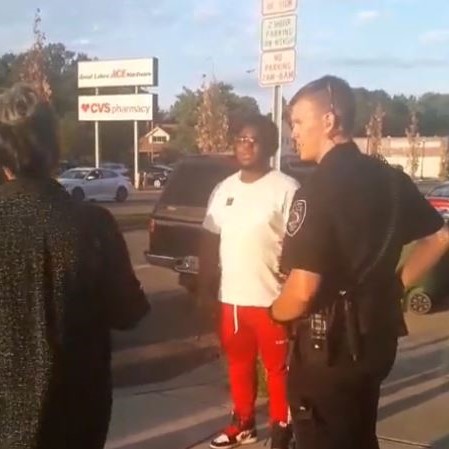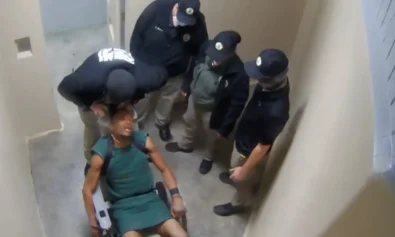When a white woman called the police on a Black man for doing nothing more than “looking suspiciously” at her, even a Michigan police supervisor responding to the claim called it “nonsense.”
Still, the call that started as a parking mix-up led Royal Oak police officers to question 20-year-old Devin Myers for more than an hour Tuesday, a restaurant manager who witnessed the encounter told the Detroit Free Press.
By the time police arrived on the scene and stopped him, Myers had parked and was walking to the Inn Season Cafe on Fourth Street in Royal Oak, the newspaper reported.

Kimiko Adolph, a woman who was walking in the same area toward the end of the encounter, videotaped what she saw play out on Facebook live.
“I was going to the CVS over here when this young man is stopped because a Caucasian lady said that he looked at her suspiciously,” Adolph said, “and he has been pulled over walking to go to eat by two police officers for suspicion of being black and looking at the Caucasian woman.”
Adolph told officers in the video that the woman who made the allegation was sitting in a car “hiding” across the street.
The footage starts with Myers and a woman identified as Inn Season manager Erin Frey talking to officers on the scene.
“They got him surrounded, so I’m not gon’ leave the brother out here,” Adolph said.
In the video, Myers is seen apologizing to the officers “for wasting your guys’ time” and sarcastically asking white people walking by not to look at him for too long.
“You guys might want to be careful there. You know they’re real suspicious around here,” Myers said. “Don’t look at me too long ’cause … the police will come harass you for looking at me for too long.”
Frey later told the Free Press she waited with the man stopped to show her support in a situation police handled “completely inappropriately.”
She said video of the incident only captures the final moments of the encounter and that police actually questioned Meyers for almost an hour before telling him he was free to go.
The situation started with Myers trying to find a parking spot on the street across from the Inn Season, Frey told the Free Press. Myers’ girlfriend was waiting for him at the restaurant at the time.
He noticed the woman who later accused him because she looked like she was about to pull out of her parking space, so he waited, Frey said. But when the driver didn’t move, he found another spot.
Later, Frey said the woman “felt threatened and thought he was suspicious, and she called the police.”
When the first officer called to the scene arrived, he “handle it so aggressively right from the get-go” that the man asked for a supervisor, Frey said.
The supervisor arrived with one other officer on motorcycles.
Myers is then shown on video explaining that if Frey was him in this situation, “you would have let her go 10 minutes ago.”
The supervisor explained that part of the reason a resolution took so long is that he was four miles away from the scene. Another reason is that it took time for the responding officer to gather all the facts, he said.
“Are we supposed to have all these facts before talking to people?” the supervisor asked.
He then called the call “nonsense.”
“All you had to do is say, ‘You know what, I’m just parking my car, minding my own business.’ Everything checks OK, and you know what,” the supervisor said during the video. “He’d be eating right now, he’d have an hors d’ oeuvre right now.”
“He did say that,” both Frey and the woman recording the video responded.
Royal Oak Mayor Michael Fournier said in a statement the Free Press obtained Wednesday that officials are reviewing what happened.
“We absolutely recognize that racial bias exists and we as a community aspire to be among those working every day to combat it,” Fournier said. “But, this is not just the work of our officers and public officials alone, but all of us, individually [and] as a community must put in the effort to recognize and come to terms with our own personal prejudices and biases.
“We are in the process of evaluating what mistakes have been made and we will own them, we will learn from them, and we will continue to strive to be better in everything we do.”


